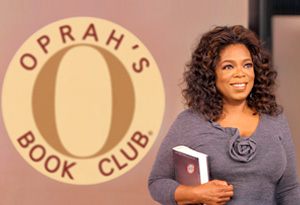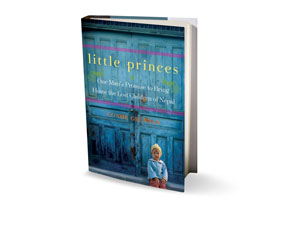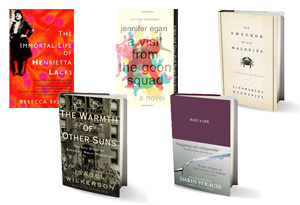Monday, May 30, 2011
Water For Elephants
Friday, May 27, 2011
What I Talk About When I Talk About Running

Thursday, May 26, 2011
Palo Alto stories by James Franco

Wednesday, May 25, 2011
Monday, May 23, 2011
Ten Micro Stories

10 Summer Reads
GRANTA 113: THE BEST OF YOUNG SPANISH LANGUAGE NOVELISTS
Please join 192 Books, Granta Books, and the Spanish Embassy for a roundtable discussion between some the Best Young Spanish Language Novelists. Andres Barba (Spain), Alberto Olmos (Spain), Antonio Ortuño (Mexico), Rodrigo Hasbun (Bolivia), Carlos Labbe (Chile) will discuss the role of translation in literature.
Building Bridges: Spanish and English Language Writers is a unique literary tour featuring some of the Best Young Spanish Language Novelists.
Craftwork with Victor LaValle
Next Word, Better Word: The Craft of Writing Poetry

Anna North’s debut novel

Complete List of Oprah's Book Club Books

Lucky Peach Subscription
It is a creation of David Chang, the James Beard Award–winning chef behind the Momofuku restaurants in New York, writer Peter Meehan, and Zero Point Zero Production—producers of the Emmy Award–winning Anthony Bourdain: No Reservations.
The Self in Poetry: New Rachel Zucker Audio Feature
"The poem is all self. All. And the poem is made necessary when the self suddenly becomes visible and unavoidable." Rachel Zucker discusses objectivity, authority, and whether the self can ever be separated from the poem.
On the web at: www.poets.org/zucker
Little Princes: One Man's Promise to Bring Home the Lost Children of Nepal

No Near Exit Now Available
CONTRIBUTORS: Edward Albee, Elisa Albert, Will Allison, Allison Amend, Jonathan Ames, Jami Attenberg, Mary Jo Bang, April Bernard, Binnie Kirshenbaum, Charles Bock, Adam Braver, Wayne Bremser, Jericho Brown, Kevin Canty, Maud Casey, Brock Clarke, Michael Collins, Sloane Crosley, Michael Czyzniejewski, Michael Dahlie, Nicholas Dawidoff, Stacia J.N. Decker, Nina de Gramont, Lisa Dierbeck, Rebecca Donner, David Ebershoff, Jennifer Egan, Courtney Eldridge, Will Eno, Marion Ettlinger, Joshua Furst, Mary Gaitskill, J. Malcolm Garcia, Diana George, Amy Gerstler, Barry Gifford, Myla Goldberg, Tod Goldberg, Lev Grossman, Jennifer Haigh, Melissa Haley, Lorraine Healy, Amy Hempel, Edward Hoagland, James Hoch, Richard Hoffman, Noy Holland, Ann Hood, A.E. Hotchner, Nathan Ihara, Molly Jong-Fast, Pagan Kennedy, Owen King, Joanna Klink, Yusef Komunyakaa, Neil LaBute, Holly LeCraw, Don Lee, Margot Livesey, Phillip Lopate, Yael Goldstein Love, Allison Lynn, Fiona Maazel, Dora Malech, David Mamet, Fred Marchant, Ben Marcus, Sebastian Matthews, David Means, Adrienne Miller, Lydia Millet, Rick Moody, Sarah Murphy, Galt Niederhoffer, Audrey Niffenegger, Jude Nutter, Ed Park, Edith Pearlman, Tom Perrotta, Patrick Phillips, Scott D. Pomfret, Dan Pope, Melissa Pritchard, Nelly Reifler, Stacey Richter, Matt Roberts, Lewis Robinson, Roxana Robinson, Peter Rock, Michael Ryan, George Saunders, Elissa Schappell, Amy Scheibe, Christine Schutt, Elizabeth Searle, Jessica Shattuck, Jim Shepard, Karen Shepard, Tom Sleigh, Alan Smithee, Wesley Stace, Mark Strand, Darin Strauss, Virgil Suarez, Anthony Swofford, Hannah Tinti, Eugenio Volpe, Daniel Wallace, Nathaniel West, Mark Wunderlich, and Paul Yoon.
Dzanc Books eBooks Club
How It WorksGet eleven books for $50, including five titles immediately upon signing up, plus a six-month subscription! This is a 43% savings compared to the cost of ordering the eleven titles individually in eBook form.
Upon signing up for the Dzanc eBooks Club, you will instantly be able to download these five books:
Then, on the first of each month, all members will receive a single title published by ourselves or one of our imprints. The eBook will be delivered by an email announcement containing a unique link on the first of the month, allowing members to immediately download and enjoy the month's book.
After the sixth month, members will be billed $5 per month to continue their subscription, receiving a fantastic new eBook the first of every month. This is also a savings of nearly 40% from the Dzanc eBooks cover price. Upcoming selections in the eBook Club include novels and short story collections by Pamela Ryder, Sean McGrady, and David Galef, as well as anthologies such as Best of the Web 2011 and No Near Exit: a Post Road Anthology.
Every title purchased as part of the eBook club includes DRM-free MOBI, EPUB, and PDF versions of the chosen title, which will allow you to enjoy it on your Kindle, iPad, Nook,Sony Reader, and other eBook reading devices, as well as your computer. This saves you money, and also ensures that whatever device you might choose to own in the future, your Dzanc books should remain compatible.
If you have any questions or concerns, please free feel to email Matt Bell at
|
Dreams of Molly by Jonathan Baumbach

Dzanc's latest title is now not only available from our website store, but also via other online locations such as IndieBound, Amazon,BN.com and more. |








